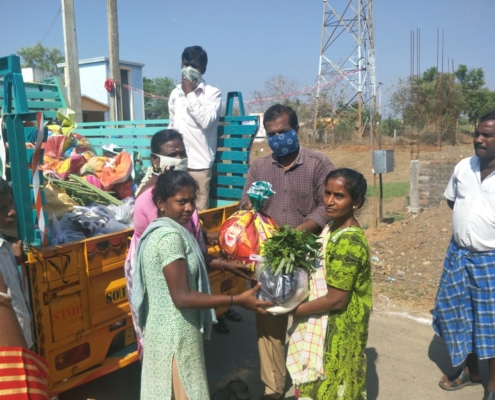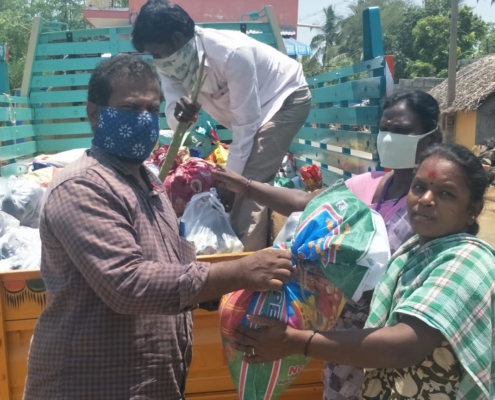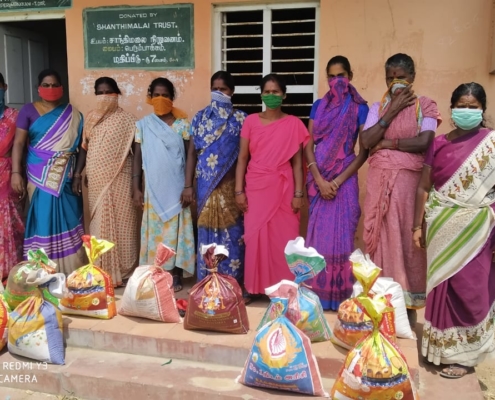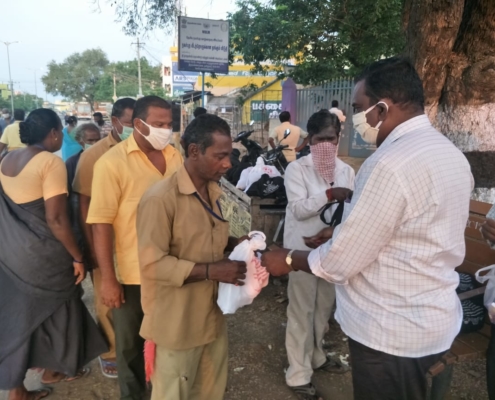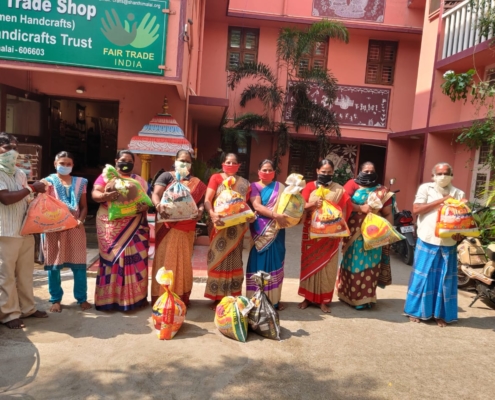The economic consequences of the coronavirus pandemic have been devastating all over the world. In India, as everywhere, the poor have suffered most. In the midst of all the challenges we face here in the United States, the Aruna Partnership community has reached out, asked how to help, and has sent generous donations to help ease the suffering in India. Your outpouring of support has helped make it possible for Shanthimalai Trust and the Mangalam Welfare Society (formerly the Shanthimalai Handicrafts Development Society) to serve hundreds of people in need during this difficult time.
The first case of coronavirus in India was confirmed at the end of January; the first case in the state of Tamil Nadu was diagnosed on March 7th. By the end of March, fearing rapid transmission through a dense population with a fragile national healthcare system, the central government imposed a strict lockdown on the whole country. This effort to prevent widespread infection was the most extreme lockdown in the world. All forms of transportation were halted, airports closed, businesses shuttered.
Residents in our district were required to apply for a pass from the police in order to go outside at all, and then only for an hour or two at a specific time of day. The police stopped individuals to check their passes, often taking photos to ensure compliance. Mail delivery stopped. Although this was paddy harvesting time, famers were not allowed to transport the paddy bags to market. They couldn’t repay bank loans they’d gotten for planting because they couldn’t sell the rice. Meanwhile, interest fees increased steadily. Food shops remained open, but with limited hours. Shelves emptied quickly and were difficult to restock because transport was so limited that wholesale food markets often had to close down. As a result, prices increased dramatically.
Many in our district are day laborers, masons, rickshaw drivers, etc., who rely on their daily wages to provide for their families. With little or no savings, and unable to buy food even if they could find it, most feared starvation more than they feared the virus
Shanthimalai Trust and the Mangalam Welfare Society (formerly Shanthimalai Handicrafts Development Society) worked closely with the District Collector in Tiruvannamalai to identify families and individuals in need. They set up a relief camp for the elderly and others who were temporarily homeless and passed out hot meals on the street to sadhus (religious renunciates who live by begging) and to others in need. They delivered food to young widows and their families, taking the sacks by small lorry from door to door. They distributed food supplies and masks in remote villagers. Six times, Shanthimalai and the Mangalam Society fed nutritious, hot meals of rice, sambar, rasam, buttermilk, and vegetable stew to groups of 300 people
The District Collector was a wonderful ally in all of this. Even so, trying to meet the need felt overwhelming at times. Mr. Manoharan, head of the Mangalam Society, wrote that in order to buy food to distribute, he had go the market at 2 am, then struggle for hours before all items were purchased. No matter how difficult the situation became, our partners in India carried on with open hearts and helping hands. Indian families with financial means contributed to their efforts.
In the villages, Shanthimalai distributed masks and food. At Premalaya, the Mangalam Society offered food and other staples to the widows. They handed out packets of fruit to police, who did an admirable job of maintaining peace under difficult circumstances.
When businesses reopened over the course of the spring and summer, workers were grateful to be able to earn an income again, even when they were restricted to working half days.
In June, the Tamil Nadu government cancelled the State final exams for the 10th and 12th grades and declared that all students would be passed. By September, it became clear that a partial lockdown would continue at least until the end of October, then it was extended into November. With the virus spreading in the area, the government declared Tamil Nadu a “red spot state”. Schools remained closed. Students, whenever possible, worked with their teachers online.
Difficult though the situation remains, there are signs of hope. The government is doing what it can, even though supplies are inadequate. The District Collector in Tiruvannamalai is very capable and does his best to distribute food to the homeless and hungry. In September, the government awarded a Certificate of “Appreciation for Excellence” to Shanthimalai for their service to the local population during the Covid-19 lockdown
The Mangalam Welfare Society and Shanthimalai Trust continue their efforts to relieve suffering as the pandemic rages on. They regularly visit the villages surrounding Arunachala to monitor the situation and determine the greatest needs.
To help: donate through Journeys of Solutions and designate the Widows of India project https://journeysofsolutions.org/make-a-donation/.

